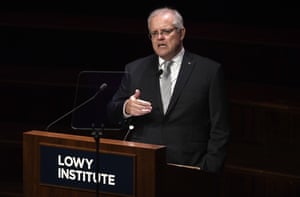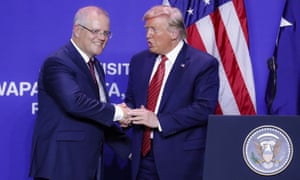The PM has taken a barely veiled swipe at the United Nations and the international institutions Australia previously championed
As Scott Morrison took to his feet in the imperial surrounds of Sydney town hall on Thursday night for a major foreign policy speech, he quietly observed he found himself governing at “an unusually delicate moment in time”.
His government had spent a frenzied week caught in the chaos and calumny of the Trump administration, with Morrison himself facing questions about exactly what he had offered his ally in the White House.
At the same time, he had been attempting to harden Australia’s position against a bellicose China without harming too greatly his country’s relationship with its most crucial trading partner.
While conceding his “delicate moment” in history, rather than tread cautiously, Morrison used the speech to take a barely veiled swipe at the United Nations and the international institutions that Australia has previously championed.
Morrison revealed – in this week of tumult both at home and abroad – that his natural political instincts on the global stage are far more closely aligned to Trump and his populist fellow travellers than they are to decades of Australian foreign policy commitment to multilateralism.
While Morrison’s position may be more nuanced than the nakedly nativist Trump, the same fundamental “nation-first” prerogative informs his foreign policy outlook.
"We should avoid any reflex towards a negative globalism that coercively seeks to impose a mandate from an often ill-defined borderless global community."
Morrison’s insistence “Australia’s international engagement will be
squarely driven by Australia’s national interests” is unremarkable
language for any leader.His government had spent a frenzied week caught in the chaos and calumny of the Trump administration, with Morrison himself facing questions about exactly what he had offered his ally in the White House.
At the same time, he had been attempting to harden Australia’s position against a bellicose China without harming too greatly his country’s relationship with its most crucial trading partner.
While conceding his “delicate moment” in history, rather than tread cautiously, Morrison used the speech to take a barely veiled swipe at the United Nations and the international institutions that Australia has previously championed.
Morrison revealed – in this week of tumult both at home and abroad – that his natural political instincts on the global stage are far more closely aligned to Trump and his populist fellow travellers than they are to decades of Australian foreign policy commitment to multilateralism.
While Morrison’s position may be more nuanced than the nakedly nativist Trump, the same fundamental “nation-first” prerogative informs his foreign policy outlook.
"We should avoid any reflex towards a negative globalism that coercively seeks to impose a mandate from an often ill-defined borderless global community."
Channelling John Howard, he cast this as a forthright but co-operative independence: “We will decide our interests and the circumstances in which we seek to pursue them.”
But what followed – condemning “a new variant of globalism that seeks to elevate global institutions above the authority of nation states to direct national policies” – echoed not only Trump, but Brexit figures such as Nigel Farage in form.
“We should avoid any reflex towards a negative globalism that coercively seeks to impose a mandate from an often ill-defined borderless global community and, worse still, an unaccountable internationalist bureaucracy,” he said.
“Only a national government, especially one accountable through the ballot box and the rule of law, can define its national interests. We can never answer to a higher authority.”
Oath of allegiance
Morrison’s attempt to buttress his country’s already unswerving allegiance to the United States has drawn his government unwillingly into the chaos of Donald Trump’s White House.Morrison and his government are now central players in the current furore enveloping the Trump administration, with proposed impeachment proceedings enraging the president, while Australia finds itself being criticised for an eagerness to assist in what is widely seen as a partisan inquiry pursued by Trump for domestic political purposes.

Alexander Downer, Australia’s former ambassador to London, is viewed by some as the catalyst for FBI director Robert Mueller’s investigation into Russian interference in the 2016 presidential election – having passed on information from Trump aide George Papadopoulos that Moscow possessed incriminating “dirt” on Hillary Clinton.
The Mueller inquiry report ultimately did not establish that the Trump campaign criminally conspired with Russia, but its findings did not exonerate the president of collusion, and outlined an extensive obstruction of justice case against him.
In May, Trump phoned Morrison and asked for his help in finding evidence to discredit the Mueller inquiry. Morrison agreed to assist.
The furore over Trump’s phone call to Morrison asking for Australia’s help, and Australia’s eagerness to assist, are perhaps as problematic not only for what they are but what they appear to be. It is unlawful for a US president to solicit foreign assistance to win an election. From the Australian end, Australia’s enthusiastic fealty gives, rightly or wrongly, the appearance of a near sycophancy to not simply the US alliance but to Trump’s personal partisan imperatives.
It might have been more adroitly handled for Morrison to refer Australia’s assistance to the level of officials – in the course of the transactions of a close working alliance – rather than committing to assist to Trump, at a personal and political level.
Hard line on China
As the Australian relationship with the US was reaffirmed, despite the attendant chaos, Morrison has hardened his rhetoric economically on China – adopting Washington’s line that World Trade Organisation rules need to be rewritten to reflect China’s emergence as one of the world’s two major economies. Morrison, like Trump, insists China can no longer be regarded by trading rules as a “developing economy” but must be treated as a “newly developed economy”."Morrison, like Trump, insists China can no longer be regarded by trading rules as a 'developing economy'."
“When we look at negotiating rules of the future of the global economy, for example, we would expect China’s obligations simply to reflect its greater power status,” he said. “This is a compliment, not a criticism.
“The rules and institutions that support global cooperation must reflect the modern world. It can’t be set and forget.”
Morrison argued it was a false dichotomy to suggest Australia’s future was a choice between the United States, its military ally and security bedrock, and China, its largest trading partner.
The US alliance will remain Australia’s fundamental security alliance while China will stay an economic and geographic fact. Despite growing trade and military tensions between Washington and Beijing, those don’t demand a binary choice, the prime minister said.
“We will … maintain our unique relationships with the United States, our most important ally, and China, our comprehensive strategic partner, in good order,” Morrison argued, “by rejecting the binary narrative of their strategic competition and instead valuing and nurturing… our close association with both. We don’t need to choose.”
Australia has drawn some “red lines” already in the China relationship: the prohibition on Huawei building the country’s 5G phone network is the most notable. But its rhetoric has also been forthright on detained Australian writer, Yang Hengjun, imprisoned for seven months in Beijing and potentially facing the death penalty over allegations of espionage.
Morrison, despite the travails of the week, counselled positivity amid the uncertainty. “Dealing with uncertainty is not new,” he said.
But a global outlook that pursues unalloyed national interest above preserving the international order that has benefited Australia for decades might simply be inviting more.

No comments:
Post a Comment